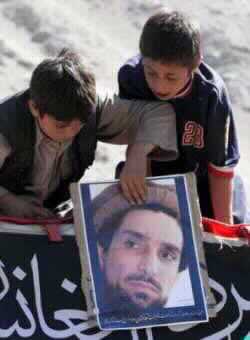The assassination one year ago of Afghanistan's legendary resistance leader Ahmad Shah Masood was an instrumental part of Osama bin Laden's plan to attack the United States two days later, his mentor and friend said. Masood Khalili, one of Masood's closest friends, was sitting next to the commander when two Arabs posing as journalists triggered a bomb inside a camera in the northern Afghan town of Khoja Bahawuddin near the Tajik border.
Miraculously Khalili survived, although he has lost sight in one eye and has hundreds of pieces of shrapnel in his legs that make walking difficult.
Masood, 48, died shortly afterwards from his wounds, as did Masood's young translator, Asim.
Khalili, now Afghanistan's ambassador to India, recalled in a recent interview the final portentous hours of the commander's life, and blamed the assassination on the al Qaeda network that sheltered in Afghanistan during the rule of the Taliban.
He told Reuters that al Qaeda leader bin Laden, also accused of masterminding the Sept. 11 attacks on New York and Washington, wanted to weaken resistance to the Taliban within Afghanistan before striking the United States.
"If you do New York without Masood, you will lose," the soft-spoken Khalili said at his home in Kabul.
"Osama bin Laden rightly thought that if he does something in New York, the Americans will rush (to Afghanistan)... and will help someone against him on the ground, without whom it will be very difficult to even think of coming to Afghanistan."
Masood, the "Lion of the Panjsher," had led a small, poorly equipped force against the Taliban and prevented the hard-line Islamic regime from taking the whole of Afghanistan.
He was also a key mujahideen fighter who helped repel the mighty Soviet Red Army after 10 years of occupation in 1989.
Using guerrilla tactics and the commanding height of mountains lining the stunning Panjsher Valley, he turned military logic on its head by beating back larger and better-equipped enemies.
But despite the death of its leader, the Northern Alliance held together and provided Washington with ground troops to follow up the intense air bombardment by U.S. fighters and bombers of Taliban strongholds.
PORTENTOUS NIGHT
Khalili recalled how Masood asked him to read from the ancient Persian poets in the early hours of Sept. 9.
"That night we talked about politics, Osama, the Pakistani militants, about terrorists being in Afghanistan, about their attacks very soon on our frontlines," Khalili said.
"At about 3:30 a.m. ... he told me: 'Let us now read."'
Following an Afghan tradition, Khalili opened his poetry book at a random page and read a few verses.
"You two should value tonight, you two should remember this night and value it because many days come, many nights go, many weeks disappear, many months and years pass, and you two will not be able to see each other on a night like this again."
Masood's dark, almond-shaped eyes widened at the words, Khalili said, and he asked him to repeat them before the two finally left each other to sleep.
At 10 a.m., the friends met again and planned lunch by the river once they had finished an interview that had been promised to two Arabs carrying Belgian passports.
Both the interviewer and cameraman appeared calm during the preamble to the interview as they outlined the questions they wanted to ask. Masood's mood darkened as they listed as many as eight questions about bin Laden.
The cameraman then moved the table, which was in front of Khalili and Masood, but did so with unusual clumsiness.
"I said, 'Have you brought a wrestler or a photographer?' Masood laughed and we also laughed."
But the interview proceeded, beginning with the question: "What is going on in Afghanistan?" and immediately after the bomb, which Khalili said was encased in the camera, detonated.
Khalili's last glance of Masood's face was a few minutes later in a helicopter. Shortly after, Khalili lost consciousness.
"I saw his face. His eyes were closed and some blood was on his face and in his hair."
Khalili regained consciousness seven days later in a German hospital, where his wife told him of Masood's death.
"Then I found the world was different. This was not the same world I was living in before Sept. 9," he said, referring to the September 11 attacks on the United States.
PHOTO CAPTION
Afghan children hang a poster of Ahmad Shah Masood to mark the first anniversary of the legendary commander's assassination at the hands of suspected al Qaeda operatives, in Khanise, 90 km (56 miles) northeast of Kabul, September 7, 2002. Afghanistan will mark the one year anniversary of Masood's death on September 9. (Re
- Author:
& News Agencies - Section:
WORLD HEADLINES


 Home
Home Discover Islam
Discover Islam Quran Recitations
Quran Recitations Lectures
Lectures
 Fatwa
Fatwa Articles
Articles Fiqh
Fiqh E-Books
E-Books Boys & Girls
Boys & Girls  Hajj Rulings
Hajj Rulings Hajj Fatwas
Hajj Fatwas














